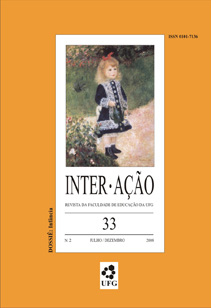UNESCO: The four pillars of ‘postmodern education’”
DOI:
https://doi.org/10.5216/ia.v33i2.5272Abstract
This article sets out to establish a relationship between discussions on education mentioned in the report to UNESCO – Education: a treasure to discover – and Lyotard’s post-modernity discourse. It presents the proposal for education from this report, highlighting the four pillars of education: learning to know, learning to do, learning to be and live together, taking as their starting point the relationship between the process of globalization and the discourse of postmodernity and these pillars in the context of an education which has become increasingly global. In this way, the meaning of these pillars and the discourse of education based on them is questioned as is their affinity to the transformation of society in the current global ranking of capital, a stage where the discourse of post-modernity is forged.Downloads
Downloads
Published
How to Cite
Issue
Section
License
Inter-Ação uses the Creative Commons Attribution 4.0 License for Open Access Journals (Open Archives Initiative - OAI) as the basis for the transfer of rights. Open access means making documents available on the Internet free of charge, so that users can read, download, copy, distribute, print, search, or link to the full text of documents, process them for indexing, use them as input data for software programs, or use them for any other lawful purpose, without financial, legal, or technical barriers.
Authors publishing in this journal agree to the following conditions:
1) Authors retain copyright and grant the journal the right of first publication, with the work simultaneously licensed under the Creative Commons Attribution License, which permits redistribution of the work with attribution and first publication in this journal.
2) Authors are permitted to enter into additional, separate agreements for non-exclusive distribution of the version of the work published in this journal (e.g., for publication in an institutional repository or as a book chapter), with attribution and first publication in this journal.
3) Authors are permitted and encouraged to publish and distribute their work online (e.g. in institutional repositories or on their home page) at any time before or during the editorial process, as this may generate productive changes as well as increase the impact and citation of the published work.















